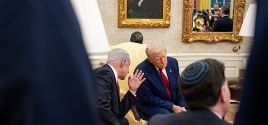US detention of Imran Khan part of trend to harass anti-drone advocatesThe vindictive humiliation of Pakistan's most popular politician shows the US government's intolerance for dissentGlenn Greenwald The Guardian Oct. 29, 2012 |
Popular 
Eloy Adrian Camarillo, 17, Arrested in Shooting Death of Infowars Reporter Jamie White

NYT: Trump Ended War With Houthis After They Shot Down U.S. Drones, Nearly Hit Fighter Jets

Ben Shapiro, Mark Levin and Laura Loomer Warn of Foreign Influence... From Qatar

Trump Advisor to Washington Post: 'In MAGA, We Are Not Bibi Fans'

Trump Cut Off Contact With Netanyahu Over 'Manipulation' Concerns, Israeli Reporter Claims
 _cropped.jpg) Imran Khan is, according to numerous polls, the most popular politician in Pakistan and may very well be that country's next Prime Minister. He is also a vehement critic of US drone attacks on his country, vowing to order them shot down if he is Prime Minister and leading an anti-drone protest march last month. Imran Khan is, according to numerous polls, the most popular politician in Pakistan and may very well be that country's next Prime Minister. He is also a vehement critic of US drone attacks on his country, vowing to order them shot down if he is Prime Minister and leading an anti-drone protest march last month.On Saturday, Khan boarded a flight from Canada to New York in order to appear at a fundraising lunch and other events. But before the flight could take off, US immigration officials removed him from the plane and detained him for two hours, causing him to miss the flight. On Twitter, Khan reported that he was "interrogated on [his] views on drones" and then added: "My stance is known. Drone attacks must stop." He then defiantly noted: "Missed flight and sad to miss the Fundraising lunch in NY but nothing will change my stance." The State Department acknowledged Khan's detention and said: "The issue was resolved. Mr Khan is welcome in the United States." Customs and immigration officials refused to comment except to note that "our dual mission is to facilitate travel in the United States while we secure our borders, our people, and our visitors from those that would do us harm like terrorists and terrorist weapons, criminals, and contraband," and added that the burden is on the visitor "to demonstrate that they are admissible" and "the applicant must overcome all grounds of inadmissibility." There are several obvious points raised by this episode. Strictly on pragmatic grounds, it seems quite ill-advised to subject the most popular leader in Pakistan - the potential next Prime Minister - to trivial, vindictive humiliations of this sort. It is also a breach of the most basic diplomatic protocol: just imagine the outrage if a US politician were removed from a plane by Pakistani officials in order to be questioned about their publicly expressed political views. And harassing prominent critics of US policy is hardly likely to dilute anti-US animosity; the exact opposite is far more likely to occur. But the most important point here is that Khan's detention is part of a clear trend by the Obama administration to harass and intimidate critics of its drone attacks. As Marcy Wheeler notes, "this is at least the third time this year that the US has delayed or denied entry to the US for Pakistani drone critics." Read More |



